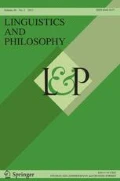Abstract
Although the view that sees proper names as referential singular terms is widely considered orthodoxy, there is a growing popularity to the view that proper names are predicates. This is partly because the orthodoxy faces two anomalies that Predicativism can solve: on the one hand, proper names can have multiple bearers. But multiple bearerhood is (prima facie) a problem to the idea that proper names have just one individual as referent. On the other hand, as Burge (J Philos 70:425–439, 1973) noted, proper names can have predicative uses. But the view that proper names are singular terms arguably does not have the resources to deal with Burge’s cases. In this paper I argue that the Predicate View of proper names is mistaken. I first argue against the syntactic evidence used to support the view and against the predicativist’s methodology of inferring a semantic account for proper names based on incomplete syntactic data. I also show that Predicativism can neither explain the behaviour of proper names in full generality, nor claim the fundamentality of predicative names. In developing my own view, however, I accept the insight that proper names in some sense express generality. Hence I propose that proper names—albeit fundamentally singular referential terms—express generality in two senses. First, by being used as predicates, since then they are true of many individuals; and second, by being referentially related to many individuals. I respond to the problem of multiple bearerhood by proposing that proper names are polyreferential, and also explain the behaviour of proper names in light of the wider phenomenon I called category change, and show how Polyreferentialism can account for all uses of proper names.
Similar content being viewed by others
References
Bauer, L. (1983). English word formation. Cambridge: Cambridge University Press.
Bauer, L. (2005). Conversion and the notion of lexical category. In L. Bauer & S. Varela (Eds.), Approaches to conversion/zero-derivation (pp. 19–30). Münster; New York: Waxman.
Bauer, L., & Varela, S. (2005). Conversion or Zero-derivation: An Introduction. In L. Bauer & S. Varela (Eds.), Approaches to conversion/zero-derivation (pp. 7–18). Münster; New York: Waxman.
Burge, T. (1973). Reference and proper names. Journal of Philosophy, 70, 425–439.
Cannon, G. (1985). Functional shift in English. Linguistics, 23(3), 411–443.
Clark, E. V., & Clark, H. H. (1979). When nouns surface as verbs. Language, 55(4), 767–811.
Cruse, D. A. (1986). Lexical semantics. Cambridge: Cambridge University Press.
Delgado, L. (2011). Between singularity and generality: The semantic life of proper names. BPhil thesis, University of Oxford.
Delgado, L. (2018a). David, some Davids, and all Davids: Reference, category change, and bearerhood of real-life names. Ph.D. Thesis, University of Barcelona.
Delgado, L. (2018b). Names are not (always) predicates. Ms., University of Barcelona.
Delgado, L. (2018c). Names vs nouns. Ms., University of Barcelona.
Elbourne, P. D. (2005). Situations and individuals. Cambridge, MA: MIT Press.
Falkun, I. L., & Vicente, A. (2015). Polysemy: Current perspectives and approaches. Lingua, 157, 1–16.
Fara, D. G. (2011). Names as predicates. Ms., Princeton University.
Fara, D. G. (2015a). Literal’ uses of proper names. In A. Bianchi (Ed.), On reference (pp. 251–279). Oxford: Oxford University Press.
Fara, D. G. (2015b). Names are predicates. Philosophical Review, 124(1), 59–117.
García-Carpintero, M. (2017). The Mill-Frege theory of proper names. Mind, fzx010, https://doi.org/10.1093/mind/fzx010.
Gray, A. (2014). Name-bearing, reference and circularity. Philosophical Studies, 171(2), 207–231.
Hanks, P., & Hodges, F. (2003). A dictionary of first names. Oxford: Oxford University Press.
Hawthorne, J., & Manley, D. (2012). The reference book. Oxford: Oxford University Press.
Higginbotham, J. (1988). Context, models, and meanings: A note on the data of semantics. In R. Kempson (Ed.), Mental representations: The interface between language and reality (pp. 29–48). Cambridge: Cambridge University Press.
Hinzen, W. (2016). Linguistic evidence against predicativism. Philosophy Compass, 11, 591–608.
Hornsby, J. (1976). Proper names: A defence of Burge. Philosophical Studies, 30, 227–234.
Jeshion, R. (2015a). Names not predicates. In A. Bianchi (Ed.), On reference (pp. 225–250). Oxford: Oxford University Press.
Jeshion, R. (2015b). Referentialism and predicativism about proper names. Erkenntnis, 80(S2), 363–404.
Jeshion, R. (2017). The’ problem for the-predicativism. Philosophical Review, 126(2), 219–240.
Jeshion, R. (2018). Katherine and the Katherine: On the syntactic distribution of names and count nouns. Theoria, 33(3), 473–508.
Katz, J. (2001). The end of millianism: Multiple bearers, improper names, and compositional meaning. The Journal of Philosophy, 98(3), 137–166.
Krifka, M., Pelletier, F. J., Carlson, G., ter Meulen, A., Chierchia, G., & Link, G. (1995). Genericity: An introduction. In G. Carlson & F. Pelletier (Eds.), The generic book (pp. 1–124). Chicago, IL: University of Chicago Press.
Larson, R., & Segal, G. (1995). Knowledge of meaning. Cambridge, MA: MIT Press.
Leckie, G. (2013). The double life of names. Philosophical Studies, 165(3), 1139–1160.
Martsa, S. (2013). Conversion in English: A cognitive semantic approach. Newcastle upon Tyne: Cambridge Scholars Publishing.
Matushansky, O. (2006). Why Rose is the Rose: On the use of definite articles in proper names. In O. Bonami & P. C. Hofherr (Eds.), Empirical issues in formal syntax and semantics (Vol. 6, pp. 285–308). Paris: CNRS.
Matushansky, O. (2008). On the linguistic complexity of proper names. Linguistics and Philosophy, 31(5), 573–627.
Matushansky, O. (2015). The other Francis Bacon: On non-bare proper names. Erkenntnis, 80, 335–362.
Nunberg, G. (1995). Transfers of meaning. Journal of Semantics, 12, 109–132.
OED: Oxford English Dictionary Second edition. (1989). Oxford: Oxford University Press (Online version June 2011).
Pelczar, M., & Rainsbury, J. (1998). The indexical character of names. Synthese, 114(2), 293–317.
Pennanen, E. V. (1971). Conversion and zero-derivation in English (Acta Universitatis Tamperensis, Series A, Vol. 40). Tampere: University of Tampere.
Perry, J. (2001). Reference and reflexivity. Stanford, CA: CSLI Publications.
Quirk, R., Greenbaum, S., Leech, G., & Svartvik, J. (1985). A comprehensive grammar of the English language. London: Longman.
Rami, D. (2014a). On the unification argument for the Predicate View on proper names. Synthese, 191, 841–862.
Rami, D. (2014b). The use-conditional indexical conception of names. Philosophical Studies, 168, 119–150.
Rami, D. (2015). The multiple uses of proper nouns. Erkenntnis, 80(S2), 405–432.
Rami, D. (2016). Names, naming and name-using practices. In P. Stalmaszczyk & L. Fernández Moreno (Eds.), Philosophical approaches to proper names (pp. 55–92). New York: Peter Lang.
Récanati, F. (1993). Direct reference: From language to thought. Oxford: Blackwell.
Sainsbury, R. M. (2015). The same name. Erkenntnis, 80, 195–214.
Sawyer, S. (2010). The modified predicate theory of proper names. In Sarah Sawyer (Ed.), New waves in philosophy of language (pp. 206–226). Basingstoke: Palgrave Macmillan.
Schoubye, A. (2017). Type-ambiguous names. Mind, 126, 715–767.
Schoubye, A. (2018). The predicative predicament. Philosophy and Phenomenological Research, 96(3), 571–595.
Segal, G. (2001). Two theories of names. Mind and Language, 15, 547–563.
Sloat, C. (1969). Proper nouns in English. Language, 45(1), 26–30.
Vendler, Z. (1967). Linguistics in philosophy. Ithaca, NY: Cornell University Press.
Voltolini, A. (1995). Indexinames. In J. Hill & P. Kotatko (Eds.), Karlovy vary studies in reference and meaning (pp. 258–285). Praha: Philosophia Publications.
Zandvoort, R. W. (1965). A handbook of English grammar. London: Longmans, Green & Co.
Acknowledgements
I’m especially indebted to Manuel García-Carpintero, Ofra Magidor, and Elia Zardini, for invaluable comments and discussion on several drafts of this paper. I would also like to thank Robin Jeshion, Claudia Picazo, Ricardo Santos, David Yates, and an anonymous referee for comments and discussion that helped me to improve this paper significantly. Different parts of the material in the paper have been presented in 2013 at the LOGOS Seminar (University of Barcelona) and at the 7th meeting of the Spanish Society for Analytic Philosophy (SEFA 2013); in 2016 at the IIF-SADAF Seminar (University of Buenos Aires), at the Metaphysics, Epistemology, Logic and Language Seminar (University of Lisbon), and at the LanCog Seminar (University of Lisbon); in 2017 at the workshop ‘Entia et Nomina 2017’ in Goa, India, at the PLM Conference (Ruhr University Bochum), and at the St Andrews Graduate Conference (University of St Andrews); in 2018 at the LEME Seminar (Federal University of Rio de Janeiro). I’d like to thank all these audiences for stimulating comments and discussion. I’m also very grateful to all the informants who shared their knowledge of their native languages with me. At different stages during the development of this paper I have benefitted from an AHRC Postgraduate Studentship Award, from a Doctoral Award from the project CONSOLIDER-INGENIO 2010 CSD2009-00056 of the Spanish Ministry of Science and Innovation on Philosophy of Perspectival Thoughts and Facts (PERSP), and from a Doctoral Award from the programme of grants to new researchers (FI-DGR) of the Catalonian Government.
Author information
Authors and Affiliations
Corresponding author
Rights and permissions
About this article
Cite this article
Delgado, L. Between singularity and generality: the semantic life of proper names. Linguist and Philos 42, 381–417 (2019). https://doi.org/10.1007/s10988-018-9251-1
Published:
Issue Date:
DOI: https://doi.org/10.1007/s10988-018-9251-1



